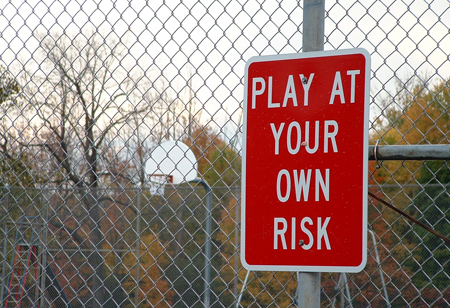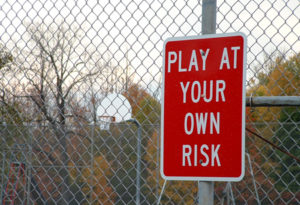Risk Aversion: Why don’t kids have ripped jeans?
Now, did you ever notice how few kids have ripped pants? When I was a kid (I grew up in Bronx during the 60’s), it was rare that a new pair of dungarees (thats what they were called back in paleolithic times) survived a week without requiring knee patches. Kids played hard back then since they were actually outside, often engaging in rough and tumble play. So I remember when it was a big deal when iron-on knee patches became available ,since it made the task of repairing pants so much easier. Now, people pay designers for factory ripped jeans.
And so following from the last blog post, I will continue to site the great philosopher (and comedian), George Carlin. In one of his stand up routines, he exhorts us to assume some level of risk and take a chance once in a while. He reminds us that our extreme caution has in fact created some extra danger. So for example, our preoccupation with germs has led to the proliferation of antibacterial soaps. He admonishes us to stop using such measures siting that “…. our immune system needs some practice.” Research actually bears that out. One of the theories for the advancing prevalence of allergies and asthma has been related to “hyper-immunity” caused by lack of immunilogical exposure to microbes. Also as it turns out, the antibacterial agents used in many soaps have hormone disrupting agents which can cause various medical issues.
I am not so personally concerned with handsoap, however , it is possibly representative of a much larger issue. There appears to be an increasing trend towards excessive caution, safety and aversion to perceived risk. Perhaps as a result of our increasing technological sophistication, we are engaging in increasing endeavors to control and sanitize our environment. But the question must be asked….”What do we stand to potentially lose by such an endeavor? Are we really willing to trade in our freedom, liberties, sense of adventure, hardiness etc. for a little comfort and perception of safety?
The term “risk aversion” is actually a term I borrowed from finance economics. It derives from the investment behavior of certain individuals who tend to lose out on market gains due to their insistence on betting on safer investments due to fears of loss. It appears that as a culture, we have become increasingly averse to risk, danger, and discomfort, and increasingly preoccupied with safety, security and ease even though the net effect of this may be to actually increase risk and hardship long term.
Tom Brokaw, in his renowned book, “The Greatest Generation” made the point, that what made them great is that they had to face great peril, hardship and sacrifice that was thrust upon them by the Great Depression and WWII. Thus, it may be concluded that a people are only as great as the risks and perils they had to endure. The notion of American exceptionalism rides perhaps on the accomplishments and deeds of previous generations which ensuing generations have yet to , in large measure, demonstrate for themselves.
I believe we must first come to understand that the answer to suffering will never be derived from the control of our world as the western materialist view would have us believe. Twenty-five hundred years ago, the Buddha laid out a clear understanding of the origins of suffering and a precise path to facilitate liberation from suffering. Antibacterial soap was not mentioned in any of the sutras as far as I know, He exhorted us to look inside to understand the nature of, and antidote to suffering. The root of all suffering and uncontentment lies with our desire and attachment. Part of that desire is to be safe, secure, and comfortable. We therefore look to our technologies to provide that. The Dalai Lama, who has a lifelong interest with technologies of all sorts, admonishes us that while technology can hold wonderful promise as tools and conveniences, they will never have the ability to curb suffering, but in fact will introduce their own brands of suffering. I personally am not anti-technological. I would not be able to post this blog were it not for the magic of personal computers and the internet. But who among us can say that we are collectively happier, more at peace and more fulfilled given all these advancements? Yes, we are living longer, can travel much easier, can exchange ideas across the globe in real time and so much more. However, in our quest for ease, productivity, comfort and safety, we are at risk for sacrificing freedom, liberty , compassion, empathy, true connectivity, and the meaningfulness in life that can only arise from personal challenge and sacrifice.
I am not suggesting that we endeavor to roll back the clock and forgo technology or other modern conveniences. But as our technological dependence escalates, we must redouble our efforts to engage our internal capabilities. We must learn to face the real source of our perception of threat, fear, insecurity, and attachment that underlies our desire for control. This is best achieved through through meditation, and mindfully exposing ourselves to the “dark emotions” that drive our compulsions to control. True freedom can only be found when we can fully embrace our fears and attachments. And true control is not requiring control.
Please feel free to post comments, insights or objections. All are welcome!






